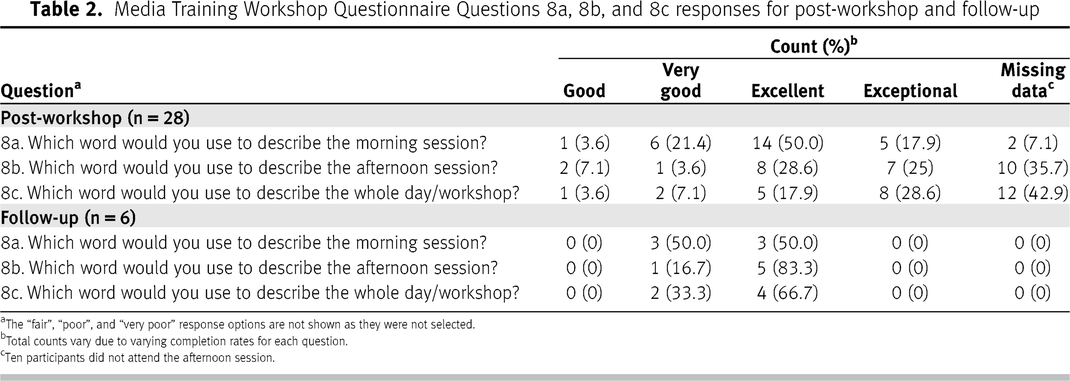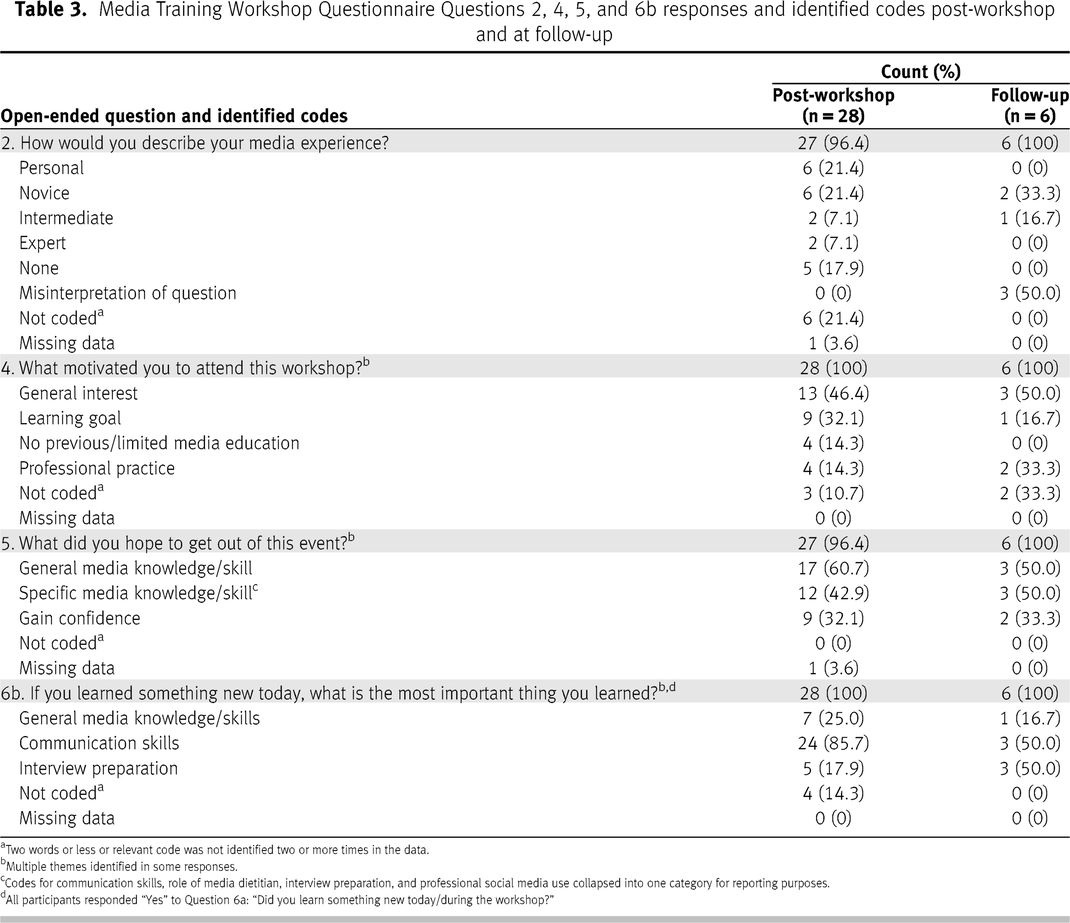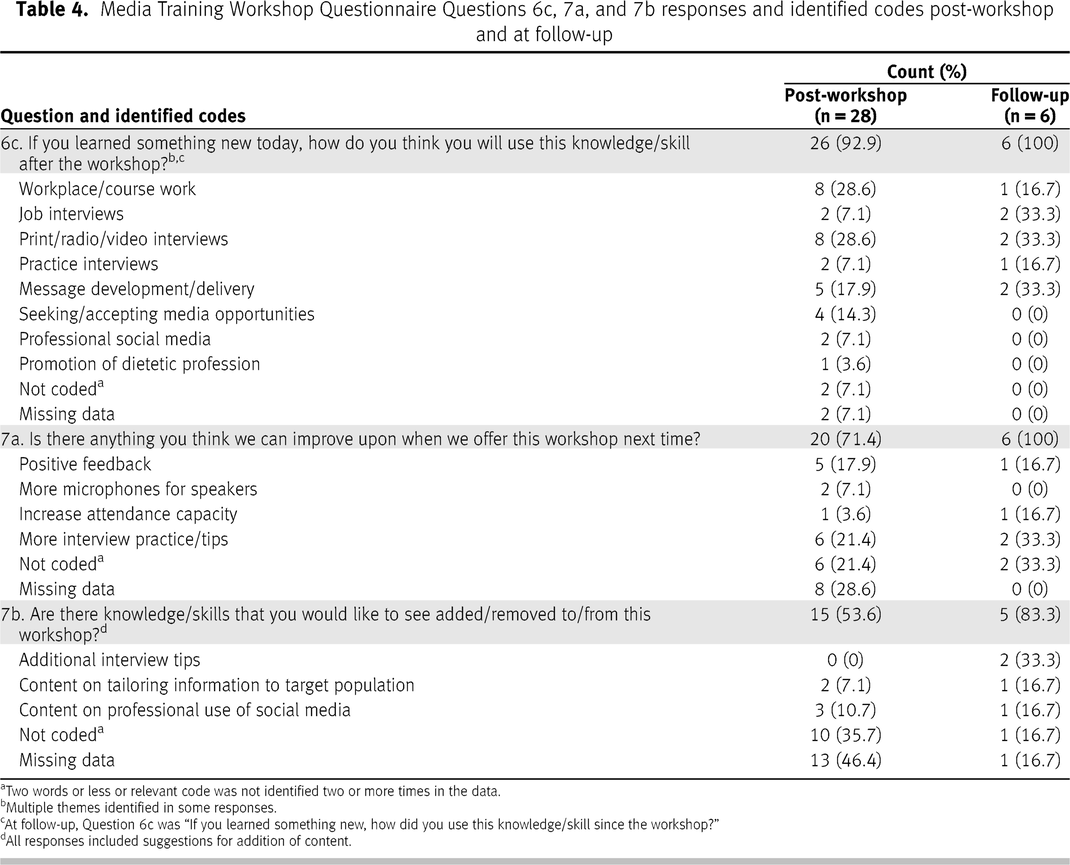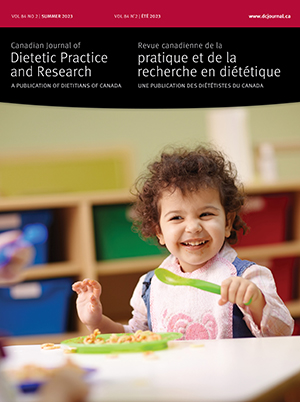Open-ended responses
Five major themes were identified: (
i) media
experience, (
ii)
motivation for attendance, (
iii) attendee planned and perceived
learning, (
iv) attendee planned and perceived
knowledge use, and (
v) Workshop
feedback. “No response” and “Misinterpretation” codes were for missing data and responses that did not answer the question. The results for each theme are presented below and counts and percentages are summarized in
Table 3.
Theme 1: Experience
Post-workshop: Twenty-seven participants described their prior media experience (Question 2). Most responses were coded as none (n = 5/28), personal (i.e., social media; n = 6/28), or novice (i.e., some experience beyond personal use; n = 6/28). Six responses were two words or less and suggested personal (n = 1/28), none (n = 3/28), novice (n = 1/28), or intermediate experience (n = 1/28).
Follow-up: Three participants misinterpreted Question 2 and described their Workshop experience positively. The other responses were coded as novice (n = 2/6) and intermediate experience (n = 1/6).
Theme 2: Motivation
Post-workshop: All participants responded to Question 4 (motivation for attendance). One response was two words (“continuing education”). General interest (n = 8/28), specific learning goal (n = 9/28), and no previous/limited media education (n = 4/28) were the most common themes. For example, “Gain insight into the role of a media dietitian. Learn key techniques and skills for communication in media” was coded as a specific learning goal with sub-themes of role of media dietitian and communication skills. Twenty-seven participants responded to Question 5 (planned learning), and identified themes included general media knowledge/skills (n = 18/28), confidence (n = 8/28), and communication skills (n = 4/28).
Follow-up: All participants responded to Questions 4 and 5. For Question 4, identified themes included general interest (n = 3/6), desire to work in/with media (n = 2/6), and a specific learning goal (n = 1/6). Themes identified in Question 5 responses were general media knowledge/skills (n = 3/6), communication skills (n = 2/6), confidence (n = 2/6), and professional social media use (n = 1/6).
Theme 3: Perceived learning
Post-workshop: All participants responded to Question 6b (new perceived learning). Three responses were two words or less. Communication skills (n = 24/28; e.g., “Interview prep tips: key messages, sound bites, bridging techniques”), general media knowledge/skills (n = 7/28), and interview preparation (n = 5/28) were themes identified.
Follow-up: All participants completed Question 6b, and responses were coded as communication skills (n = 3/6), interview preparation (n = 3/6), and general media knowledge/skills (n = 1/6).
Theme 4: Knowledge use
Post-workshop: Twenty-six participants completed Question 6c (planned knowledge use). Themes identified included knowledge/skills application in the workplace and (or) course work (n = 8/28), media interviews (n = 8/28), message development/delivery (n = 5/28), and pitching to media/accepting media opportunities (n = 4/28).
Follow-up: All participants responded to Question 6c and reported application of perceived knowledge/skills in message development/delivery (n = 2/6), media (n = 2/6) and job (n = 2/6) interviews, workplace/course work (n = 1/6), and practice interviews (n = 1/6).
Theme 5: General feedback
Post-workshop: Twenty participants provided feedback (Question 7a). Fourteen responses were assigned a code, and two were two words or less (“No”, “Amazing presentation”). Themes were general positive feedback (n = 5/28), more interview practice/tips (n = 6/28), more microphones for speakers (n = 2/28), and increased attendance capacity (n = 1/28). Fifteen participants provided suggestions (Question 7b); two responses were one word (“No”). Two themes were identified in the remaining responses: addition of content on professional social media (n = 3/28) and tailoring information to a target population (n = 2/28).
Follow-up: All participants completed Question 7a. Themes were general positive feedback (n = 1/6), more interview practice/tips (n = 2/6), and increased attendance capacity (n = 1/6). Five participants responded to Question 7b; one response was one word (“No”). Themes identified were more content on interview tips (n = 2/6), tailoring information to a target population (n = 1/6), and professional social media (n = 1/6).
No participants suggested removing content from the Workshop.







